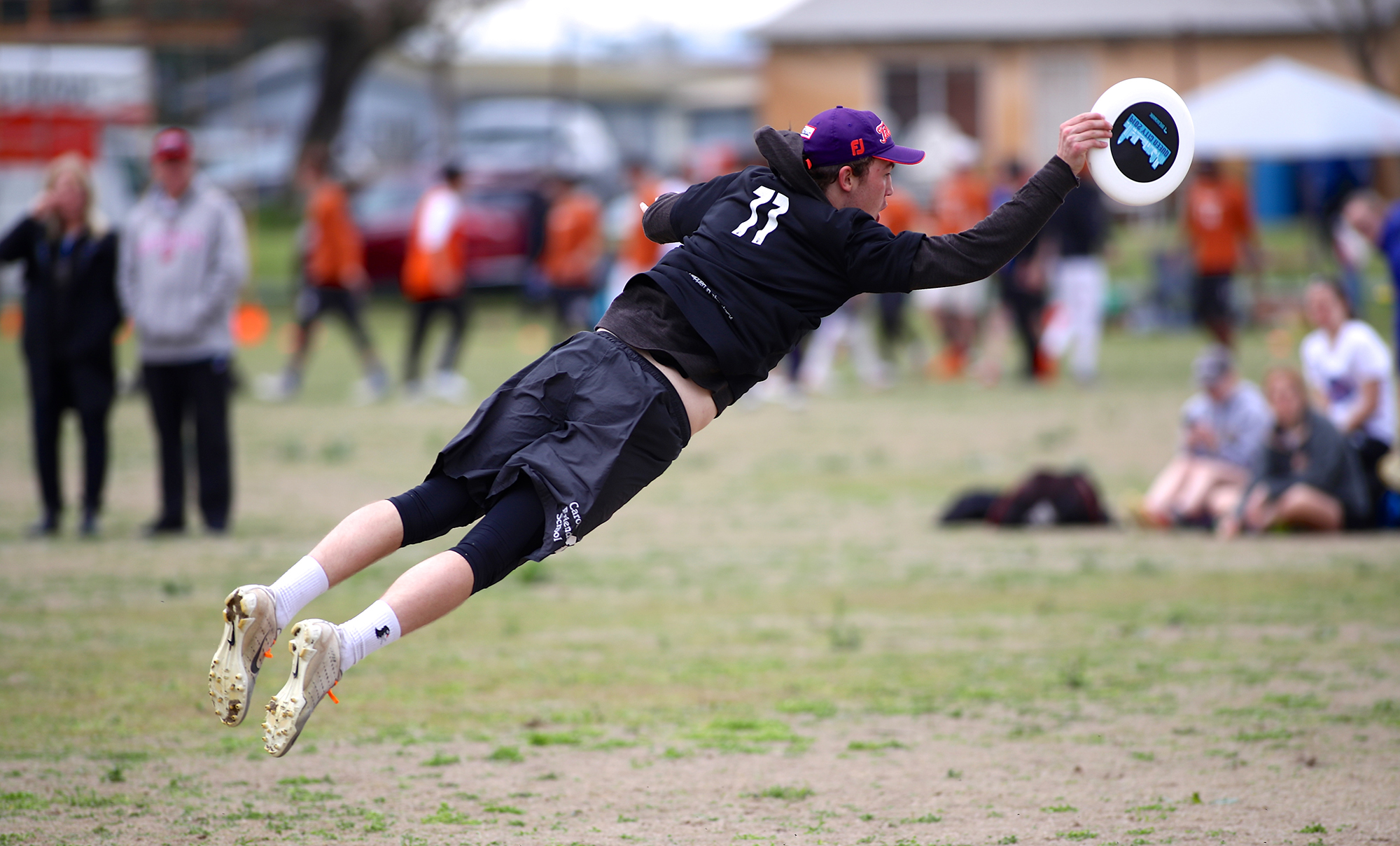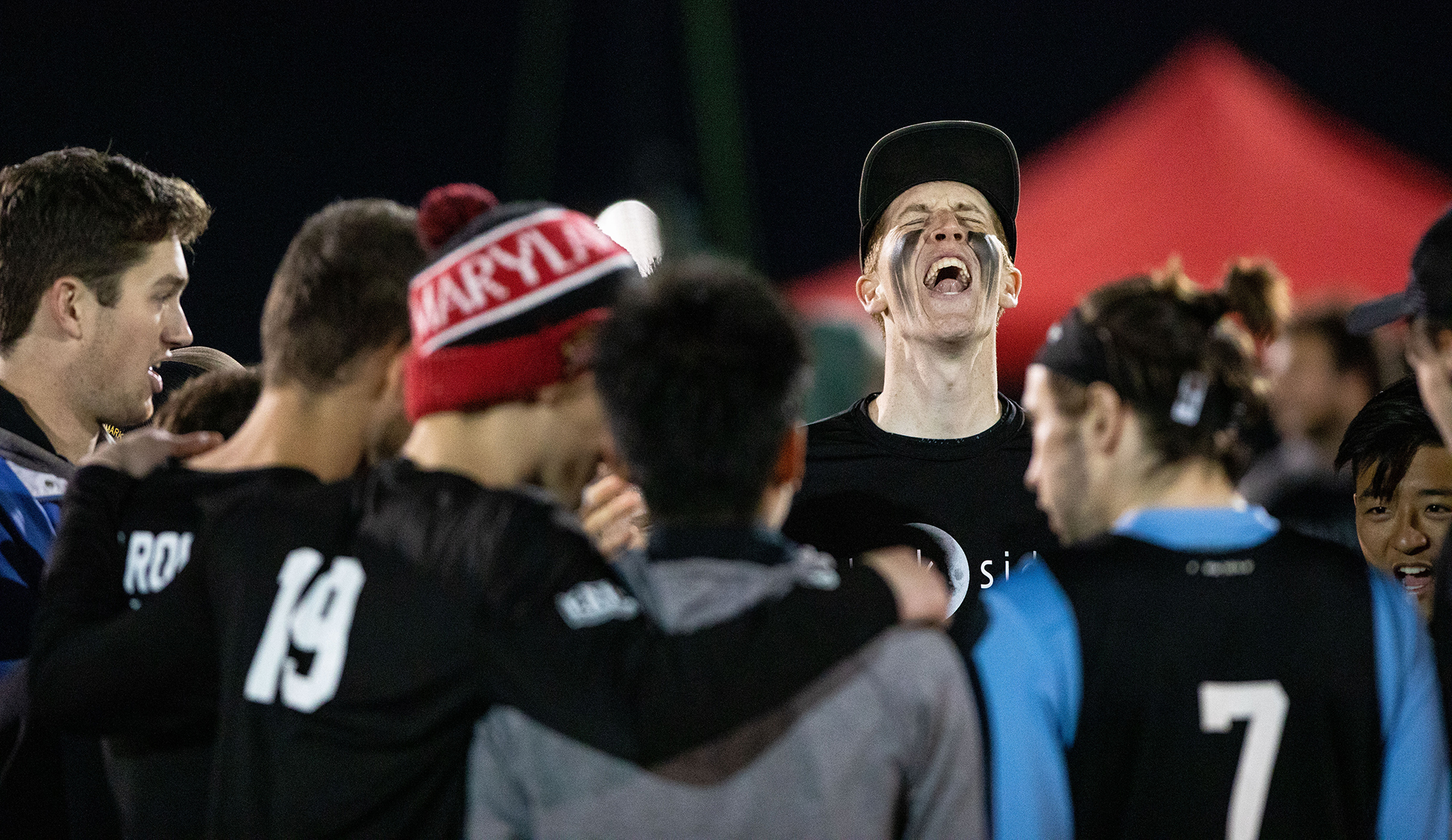Ultimate Rising: UNC’s Darkside Overshadows Its Rivals
Posted on April 26, 2019
UNC’s Liam Searles-Bohs from Durham scores a goal against Wisconsin at the 2019 Stanford Invite in Stevinson, Calif., in early March. It was Darkside’s third tournament win of the year. (Photo by Brian Whittier)
When Mike Denardis started playing ultimate Frisbee at the University of Iowa more than 20 years ago, the game — for the uninitiated, think soccer or football with a flying disc — was still mostly free-spirited and rule-less. Slow-cooked in hippie origins, it was a short, carefree saunter away from that other counter-culture baby, hacky sack.
“It was essentially like you took a piece of Haight Street in San Francisco and made a sport,” said Denardis, who owns the Raleigh Flyers professional ultimate team and coaches Raleigh’s elite club team, Ring of Fire. “It wasn’t like a bunch of jocks running around yelling at each other to get in position.”

Ultimate has grown up, and as its star has ascended over the past six years, no university has helped raise the game’s competitive profile more than Carolina. (Photo by Ben McKeown)
It is now. The sport’s college championships have been televised on ESPN since 2013, and the International Olympic Committee recognized it the same year, making it eligible for inclusion in future Olympic competition. Ultimate has grown up, and as its star has ascended over the past six years, no university has helped raise the game’s competitive profile more than Carolina. With Denardis serving as a volunteer coach and mentor, UNC’s men’s club team has won two of the past four national championships (2015 and 2018) and made the national semifinals for five consecutive years. Darkside, as the club is known, is the only Division I college team among the more than 400 (men’s and women’s) that play nationally to boast such credentials.
On a chilly night in Chapel Hill, Darkside rolls through drills and scrimmages with the purpose of Carolina’s better-known varsity teams. Besides meeting for two-hour practices three nights a week, team members have regular weight-lifting sessions followed by track workouts, and they get together to break down videotape after games. Most of the players live together, in pseudo-fraternity style, contributing to an idea you hear a lot at Finley Fields: the Darkside culture.
Players say they aren’t just shooting for another title in May (they are favored to win again); they are aiming to build a sustainable dynasty in a sport that is experiencing a surge in popularity — especially throughout Raleigh, Durham and Chapel Hill, where both recreational and traveling youth leagues have emerged as an alternative to soccer and football. More than 1,300 kids now play ultimate in the Triangle, and some of those kids will one day be Darkside members.























“We have sixth and seventh graders locally who are starting to play ultimate at 12, 13 years old,” said Darkside president and senior Jesse Kovacs, who coaches the mixed gender ultimate team at Phillips Middle School in Chapel Hill. He’s one of several UNC players who instruct youth teams. “Five years ago, you’d have a couple of guys on Darkside who’d played in high school. Now, we have two guys on our team who’ve played since middle school. The next generation is going to be so much more skilled.”
They’ll have a lot of catching up to do to reach UNC fifth-year senior Matt Gouchoe-Hanas. The team’s field general, the reigning Division I Player of the Year and a member of the U.S. national team who competed at the world championships last summer, Gouchoe-Hanas started playing ultimate while in high school at Carolina Friends School in Durham. He’d been a “pretty good” baseball and basketball player and was less skilled at soccer; until ultimate, he couldn’t find a sport that could use both his speed and his preference for strategy over athleticism.
(Ultimate doesn’t hew to a body type; Gouchoe-Hanas is a reedy 5-foot-10, while last year’s national defensive player of the year, Nathan Kwon ’18, stood just 5-2.)
By traditional sports standards, ultimate retains a few of its tie-dyed roots even while stepping up its competitiveness. In addition to being no-contact, ultimate has no referees; it’s governed by what it calls the “spirit of the game,” in which players are required to find agreement on when a foul has been committed or a rule broken.
“That suits me,” said Gouchoe-Hanas, who is a favorite to win the Callahan Award this year, ultimate’s Heisman Trophy. “I am very opposed to conflict, and ultimate meshes well with how I was raised in terms of getting along with other people, communicating, solving problems verbally and thinking critically about how we engage with one another.”
But the most exciting thing about ultimate for Gouchoe-Hanas is its future, and not just for the men in Chapel Hill — the UNC women’s club team, Pleiades, finished fifth in 2018 and was ranked second as tournament time approached this season. On the evolutional spectrum of game strategy, ultimate still tips closer to Naismith’s peach basket than Dean Smith’s Basketball: Multiple Offense and Defense.That leaves a lot of room to have an impact on a rising — and maybe one day, Olympic — sport.
“In a sport like basketball, there’s a lot of data and a lot of history out there about what works and what doesn’t,” he said. “But here, I have an opportunity to learn and coach and be on the leading edge of developing ultimate, to influence the future.”
— Beth McNichol ’95
Thanks for reading the Carolina Alumni Review
Carolina Alumni members, sign in to continue reading.
Not yet a member? Become one today.


